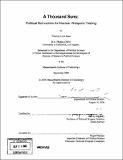| dc.contributor.advisor | Harvey Sapolsky. | en_US |
| dc.contributor.author | Raas, Whitney | en_US |
| dc.contributor.other | Massachusetts Institute of Technology. Dept. of Political Science. | en_US |
| dc.date.accessioned | 2007-05-16T18:37:04Z | |
| dc.date.available | 2007-05-16T18:37:04Z | |
| dc.date.copyright | 2006 | en_US |
| dc.date.issued | 2006 | en_US |
| dc.identifier.uri | http://hdl.handle.net/1721.1/37436 | |
| dc.description | Thesis (S.M.)--Massachusetts Institute of Technology, Dept. of Political Science, 2006. | en_US |
| dc.description | Includes bibliographical references. | en_US |
| dc.description.abstract | Nuclear weapon testing is the final step in the nuclear development process, an announcement of ability and strength. The consequences of a nuclear test are far from easy to bear, however: economic sanctions can be crippling and nuclear capability automatically makes one a nuclear target. Why, then, do states test nuclear weapons? This thesis aims to determine the answer to this question using India as a model. It is well known that India tested nuclear weapons in 1974 and in 1998, but less well known are the near-tests of 1983, 1995, and 1996. This thesis examines the situation in these years and the details of the nuclear decisions based on four hypotheses: technical concerns, security and power, domestic politics, and norms and ideas. This study shows that while all four of these theories play a role, technical concerns (contrary to popular belief) are very minor portion of the overall decision to test a nuclear weapon and are relegated to an excuse for scientists. Domestic politics, especially the political fortunes of those in power, play a large role, especially when combined with real, existential security concerns. Similarly, the prestige and status that leaders believe is imparted by nuclear ability is of major import. Understanding the reasons for nuclear testing will lead to fewer nuclear surprises in the future and may help to address the concerns of the growing number of states with latent nuclear capabilities. | en_US |
| dc.description.statementofresponsibility | by Whitney Lyke Raas. | en_US |
| dc.format.extent | 84 leaves | en_US |
| dc.language.iso | eng | en_US |
| dc.publisher | Massachusetts Institute of Technology | en_US |
| dc.rights | M.I.T. theses are protected by copyright. They may be viewed from this source for any purpose, but reproduction or distribution in any format is prohibited without written permission. See provided URL for inquiries about permission. | en_US |
| dc.rights.uri | http://dspace.mit.edu/handle/1721.1/7582 | |
| dc.subject | Political Science. | en_US |
| dc.title | A thousand suns : political motivations for nuclear weapons testing | en_US |
| dc.type | Thesis | en_US |
| dc.description.degree | S.M. | en_US |
| dc.contributor.department | Massachusetts Institute of Technology. Department of Political Science | |
| dc.identifier.oclc | 123362151 | en_US |
